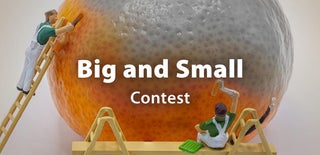Introduction: Baking, Broiling and Roasting
In this lesson, we're going to cover different cooking techniques that use an oven!
I really love cooking in the oven. In most cases it takes longer, but you don't have to babysit the food very much. That's a huge bonus if you're wanting to relax a bit after work or if you're already cooking something on the stovetop!
Baking and roasting are fairly similar, but broiling is a beast all its own. In the next steps, I'll walk you through each technique and give you some easy recipes to try out.
P.S. When I say baking, I'm not talking about the pastry-cookies-cakes kind. If you're interested in that, please check out wold630'sScience of Baking Class. :D
Step 1: What Are Baking and Roasting?
Baking and roasting are both methods of cooking in the oven, and the terms are often used interchangeably. This can be a little confusing - but honestly, it doesn't matter too much! Below is how I typically try to explain the difference. However, you should remember that there are a ton of exceptions to these guidelines when it comes to naming a recipe! (For example - my "oven baked onion rings" are cooked at 450 F / 230 C - which is actually a roasting temperature.)

Photo above: oven baked French toast
Baking
Often done in a deeper pan - I like to use my 9x13 inch Pyrex baking pan for many baked foods. With baking, you're not as worried about browning or caramelization, you are just wanting to cook the food completely through. In some cases, you even cook the food with a bit of liquid.
Baking is usually done at 375 F / 190 C and below.
Good examples of baking: hash brown casserole, chicken pot pie, baked pork chops, oven cooked ribs with spicy dry rub

Photo above: roasted edamame
Roasting
Roasting is usually done on a metal sheet pan for maximum browning. Temperatures for roasting typically start at 375 F / 190 C and go up to around 450 F / 230 C.
Roasting is much like pan frying - you need to use a good bit of oil to keep the food from sticking, and you also should try to avoid crowding the food so it can brown properly. You can also try lining your sheet pans with parchment paper or aluminum foil to help with sticking and cleanup.
Good examples of roasting: sweet potato fries, pork tenderloin, goat cheese stuffed peppers, roasted broccoli
Step 2: What Is Broiling?

Photo above: delicious broiled grapefruit!
Broiling is a fast and very high heat cooking method. (500-550F / 260-290 C) It's used to cook thin cuts of meat and fish, to quickly brown vegetables, or to melt cheese. I admit I don't use it very often, but it can come in really handy for crisping up food!
Depending on the model of oven you have, your broiler will be either situated on the "ceiling" of the oven, or in a drawer compartment below the oven. If your broiler is in the top of the oven, make sure to move one of your oven racks to the highest position so the heat can REALLY get into what you're cooking.
Gas ovens will have flame broilers, while electric ovens using heating elements. Sometimes broilers have "high" and "low" settings - sometimes it's just on or off!
One caveat to broiling: cooking happens fast! This is not a cooking technique that allows you to wander off and do something else. Stick close to the oven and check your food frequently. You can go from perfect to burnt very quickly!
Good examples of broiling: oven nachos, broiled asparagus
Step 3: Baking, Broiling and Roasting Recipes

Now that you've learned about these three cooking techniques, it's time to try your hand at some recipes!
Step 4: Lesson Quiz
{
"id": "quiz-1",
"question": "Which cooking technique uses the highest temperature?",
"answers": [
{
"title": "Baking",
"correct": false
},
{
"title": "Broiling",
"correct": true
},
{
"title": "Roasting",
"correct": false
}
],
"correctNotice": "That's correct!",
"incorrectNotice": "That is incorrect."
}
{
"id": "quiz-2",
"question": "Which is a typical roasting temperature?",
"answers": [
{
"title": "200 F / 95 C",
"correct": false
},
{
"title": "350 F / 175 C",
"correct": false
},
{
"title": "425 F / 220 C",
"correct": true
}
],
"correctNotice": "That's correct!",
"incorrectNotice": "That is incorrect."
}
{
"id": "quiz-3",
"question": "Which cooking techniques are often mixed up?",
"answers": [
{
"title": "Baking and roasting",
"correct": true
},
{
"title": "Baking and broiling",
"correct": false
},
{
"title": "Roasting and broiling",
"correct": false
}
],
"correctNotice": "That's correct!",
"incorrectNotice": "That is incorrect."
}
Step 5: Congrats - You've Graduated!

Photo above: dinner featuring my Pressure Cooker Pulled Pork Recipe
Thank you so much for reading through and taking my class! I hope you enjoyed it and learned a few new things.
Feel free to ask questions on the class page or to message me from my member page here on the site. And make sure to browse through my instructables for even more recipes not included in the class!
Happy cooking! :D













